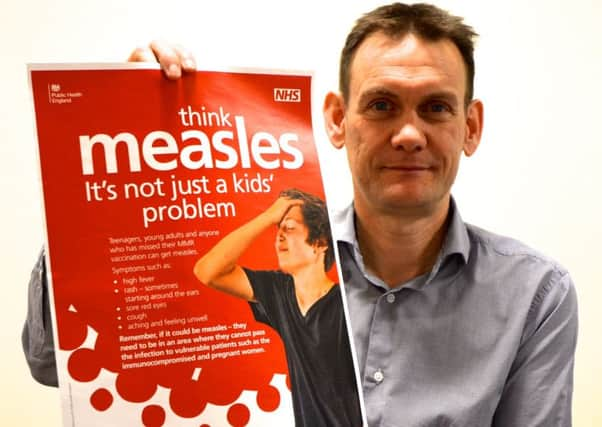Column: Concern over current risk of measles


Measles is highly infectious – a cough or sneeze can spread the virus over a wide area. It can be very unpleasant and can lead to serious complications.
Low levels of immunisation have led to an increase in people not protected. Outbreaks occasionally occur. I want to flag up a current risk to people living in the Doncaster area who haven’t been vaccinated.
Advertisement
Hide AdAdvertisement
Hide AdLast year, there were 34 cases in Leeds and presently there is an on-going outbreak in Bradford. This is worrying, as whenever there has been an outbreak in Bradford, Doncaster has usually followed, with cases being confirmed locally.
You can get measles if you haven’t been vaccinated or haven’t had it before, it’s most common in young children. The infection usually lasts around seven to 10 days.
The illness can be severe in adults and can last for longer. Someone with measles can spend five days in bed and be off school or work for 10 days. Adults are also more susceptible to complications.
Initial signs of measles develop around 10 days after you’re infected and can include:
Advertisement
Hide AdAdvertisement
Hide Adn Cold-like symptoms, such as a runny nose, sneezing and a cough
n Sore, red eyes that may be sensitive to light
n High temperature (fever), which may reach around 40C (104F)
n Small greyish-white spots on the inside of your cheeks
A few days later, a red-brown blotchy rash can appear. It usually starts on the head or upper neck, before spreading outwards to the rest of your body.
To be protected from measles and other infections, including mumps and rubella, you need to be immunised with two doses of MMR vaccine.
Advertisement
Hide AdAdvertisement
Hide AdIf you have missed one or both of your MMR vaccinations, please contact your GP surgery to arrange an appointment to get the protection you need.
By getting immunised you will not only protect yourself but those people around you, especially children and pregnant women and those who cannot have MMR because they have illnesses such as leukaemia. They can get some protection if enough of the population is vaccinated, so measles is eliminated.
If you think you have measles, phone for advice first, as attending a medical establishment could spread it to others. If you or your child can’t remember if you’ve had both vaccinations, it’s better to book an appointment to have MMR vaccine because extra doses pose no health risk.